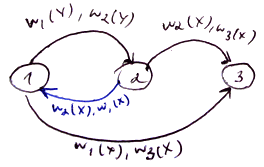Contents
Serializable Schedule
Definitions
An action is
- $r(X)$ - read database element $X$ or
- $w(X)$ - write database element $X$
- we abstract away from the actual values that are read/written, we are not interested in them
A transaction $T$ is a sequence of action
- $r(A), r(B), w(A), w(B)$
A schedule is a sequence of actions that belong to different transactions
- $r_1(A), w_1(A), r_2(A), w_2(A), r_1(B), w_1(B), r_2(B), w_2(B)$
- $r_i(X)$ denotes that this action belongs to transaction $T_i$
Serializability
a serial schedule is a schedule in which transactions are executed consequently, not concurrently
- e.g. first all actions of $T_1$ and then all actions of $T_2$
- $\underbrace{r_1(A), w_1(A), r_1(B), w_1(B)}_{\text{all actions of $T_1$}}, \underbrace{r_2(A), w_2(A), r_2(B), w_2(B)}_{\text{all actions of $T_2$}}$
Serializable Schedule
- a schedule is called serializable is there exists an equivalent serial schedule
- even though we may execute actions concurrently, the effect is guaranteed to be the same as if it was run in isolation
- $S_1 = r_1(A), w_1(A), r_2(A), w_2(A), r_1(B), w_1(B), r_2(B), w_2(B)$
- $S_2 = r_1(A), w_1(A), r_1(B), w_1(B), r_2(A), w_2(A), r_2(B), w_2(B)$
- $S_1 \equiv S_2$, $S_2$ is serial, so $S_1$ is serializable
Not serializable:
- Write-Read conflict:
- $r_1(A), w_1(A), r_2(A), w_2(A), r_2(B), w_2(B), r_1(B), w_1(B)$
- write by $T_2$ happens before read by $T_1$, but $T_1$ started earlier
- it's not equivalent to any serial schedule
We want to schedule our actions in such a way that the result is serializable
Conflict-Serializability
Serializability is very hard to achieve
two actions are in conflict if
- they belong to the same transaction
- both deal with the same element and one of the actions is a write
A schedule is conflict-serializable if
- we can obtain a serial schedule by swapping actions that are not in conflict
Example:
- $S_1 = r_1(A), w_1(A), \underbrace{r_2(A)}_\text{(1)}, \underbrace{w_2(A)}_\text{(2)}, \underbrace{r_1(B)}_\text{(3)}, \underbrace{w_1(B)}_\text{(4)}, r_2(B), w_2(B)$
- $(1) + (2)$ are not in conflict with $(3) + (4)$: they use different DB items
- can swap them and get a serial schedule
- $S_2 = r_1(A), w_1(A), r_1(B), w_1(B), r_2(A), w_2(A), r_2(B), w_2(B)$
- i.e. $S_1$ is conflict-serializable
NB:
- you never can reorder actions of the same transaction
- otherwise you may change the behavior of this transaction
- what is more, by reordering actions within same transactions it's not possible to get something serial from not serializable schedule
Conflict-Serializability $\Rightarrow$ Serializability
but converse is not true
- $S_1 = w_1(Y), w_2(Y), w_1(X), w_3(X)$
- $S_2 = w_1(Y), w_1(X), w_2(X), w_3(X)$
- $S_1 \equiv S_2$: in $Y$ there's a value written by $T_2$, and in $X$ the value written by $T_3$
- but S_1 is not Conflict-Serializable, but Serializable: we cannot swap $w_2(X)$ and $w_1(X)$
Precedence Graph
There is an algorithm that checks if a schedule is conflict-serializable
construct a precedence graph:
- suppose you have a schedule $S$ with several transactions
- create a node for each transaction
- connect $T_i$ with $T_j$ if
- there $\exists$ actions $a_i \in T_i, a_j \in T_j$ s.t.
- $a_i$ precedes $a_j$ and
- $a_i$ are in conflict $a_j$ and
Example 1:
- $S_1 = {\color{red}{r_2(A)}}, {\color{blue}{r_1(B)}}, w_2(A), r_3(A), w_1(B), {\color{red}{w_3(A)}}, r_2(B), {\color{blue}{w_2(B)}}$
-

Example 2:
- $S_2 = w_1(Y), w_2(y), w_2(X), w_1(X), w_3(X)$
-

Thm If the precedence graph $G$ of a schedule $S$ is a DAG then
- $S$ is conflict-serializable
- otherwise it's not
Suppose we have a cycle $T_1 \to ... \to T_n \to T_1$ in $G$
- it means there $\exists$ action $a_1 \in T_1$ on some database item $X$ that follows $a'_n \in T_n$ on the same $X$
- we cannot move $a_1$ by conflict-free swapping to the front
- i.e. cannot put $a_1$ before all actions of $T_n$
- there also $\exists$ $a_n$ that follows some action $a'_1 \in T_1$
- but we cannot move $a_n$ either because of some action $a_{n-1} \in T_{n-1}$
- i.e. we cannot have a conflict-serializable schedule
But if $G$ is a DAG, we can obtain an equivalent conflict-serializable schedule by Topological Ordering
- if there are no cycles in $G$ then
- there $\exists$ a transaction $T_A$ that has no incoming edges in $G$
- otherwise there would be a cycle
- let $a_1$ be the first action of $T_A$
- can move $a_1$ by conflict-free swapping to the front
- since $T_A$ has no incoming edges, there are no actions that conflict with $a_2$
- let $a_2$ be the second action of $T_A$
- also can move it to the front
- repeat for all actions $a_i \in T_A$
- we end up with the following schedule:
- $S' = \underbrace{a_1, a_2, ..., a_k}_{\text{all actions $\in T_A$}}, \underbrace{b_1, c_1, ..., z_p}_{\text{all actions $\not \in T_A$}}$
- now remove all actions of $T_A$, let $G$ be the precedence graph of this schedule and repeat
If there are 2 or more nodes with no incoming edges, just pick one of them
- the result in any case will be serial
- only the order may be different
$\square$
Schedulers
A Scheduler is a component of Transaction Manager that schedules read/write requests.
The following schedulers produce Conflict-Serializable Schedules: